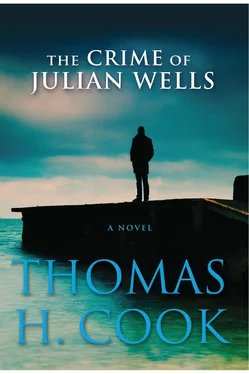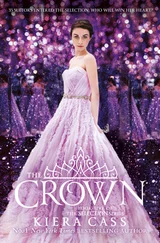Thomas Cook - The Crime of Julian Wells
Здесь есть возможность читать онлайн «Thomas Cook - The Crime of Julian Wells» весь текст электронной книги совершенно бесплатно (целиком полную версию без сокращений). В некоторых случаях можно слушать аудио, скачать через торрент в формате fb2 и присутствует краткое содержание. Год выпуска: 2012, ISBN: 2012, Издательство: Grove Press, Жанр: Криминальный детектив, на английском языке. Описание произведения, (предисловие) а так же отзывы посетителей доступны на портале библиотеки ЛибКат.
- Название:The Crime of Julian Wells
- Автор:
- Издательство:Grove Press
- Жанр:
- Год:2012
- ISBN:9780802194589
- Рейтинг книги:5 / 5. Голосов: 1
-
Избранное:Добавить в избранное
- Отзывы:
-
Ваша оценка:
- 100
- 1
- 2
- 3
- 4
- 5
The Crime of Julian Wells: краткое содержание, описание и аннотация
Предлагаем к чтению аннотацию, описание, краткое содержание или предисловие (зависит от того, что написал сам автор книги «The Crime of Julian Wells»). Если вы не нашли необходимую информацию о книге — напишите в комментариях, мы постараемся отыскать её.
The Crime of Julian Wells — читать онлайн бесплатно полную книгу (весь текст) целиком
Ниже представлен текст книги, разбитый по страницам. Система сохранения места последней прочитанной страницы, позволяет с удобством читать онлайн бесплатно книгу «The Crime of Julian Wells», без необходимости каждый раз заново искать на чём Вы остановились. Поставьте закладку, и сможете в любой момент перейти на страницу, на которой закончили чтение.
Интервал:
Закладка:
He had repeated these pronouncements in almost every interview since his release. He had also appeared on radio and television, and with each appearance, according to one editorial, “he becomes more bold and outrageous. He grows fat on ill repute and displays his crimes like medals.”
As the years passed, less and less notice was paid to him, though he clearly took every opportunity to regain the public eye. Once, he even ran for election in the small district in which he lived. He was soundly beaten, but his campaign of “blood and fire” was vociferous enough to get him yet another brief burst of attention.
After this election, Loretta and I discovered, he had more or less faded from public attention until another series of articles appeared in a paper called Hoy, a small Buenos Aires weekly. They were written by one David Leon, and their tone, though not sympathetic, was curiously tinged with what Loretta called “a little mist of understanding.” Not enough to obscure El Arabe’s deeds, she went on to tell me, but careful to place them within the context of Argentina’s tumult, the raging battles that had rocked the country, the kidnappings and assassinations, the economic instability, all of which had combined, he wrote, “to inject in every vein a liquid, icy fear.”
“This is our man,” Loretta said as she handed me the first of Leon’s articles. “This is the man who can help us meet El Arabe.”
In the photograph on the front page of Leon’s series of articles, Hernando Vilario stood on a large veranda, his back to a sprawling jungle, naked to the waist and staring straight into the camera as if it were a gun. The brutality that came from him seemed the sort that must have been forged in man’s early caves, hard beyond measure, merciless, and without remorse. But to this otherwise dreadful portrait, he had added a string of wooden beads. They hung from his neck, so brightly polished they glinted in the sunlight.
They might have come from anywhere, but the last time I had seen such beads, they had belonged to Marisol.
I didn’t mention this to Loretta, however, because I saw no reason to. Even had I known absolutely that they were the same beads Marisol had worn so many years before, I still had no idea whether El Arabe had violently yanked them from her neck or whether she’d given them to him sweetly, tenderly, her eyes glittering with their shared work, a little gift in appreciative commemoration of their partnership in crime.
26
We arrived in Buenos Aires on a clear, bright day, not unlike my first visit. That was many years before, but as the cab made its way down Avenida 9 de Julio, I recalled that time not as something that had vanished, but as a time whose still-obscure events were now adding a fierce purpose to my life. Of course, I also knew that part of that new purpose involved Loretta, who sat beside me, gazing out at the streets of the city.
“You look like you did the first time I saw you,” I told her now.
She looked at me. “Hardly.”
“No, seriously,” I said. “I once read that fear is the last reflex to leave us, but with you, I think it will be curiosity.”
She studied me a moment, then said, “You know, Philip, I think that’s the nicest thing anyone ever said to me.”
We reached the hotel a few minutes later. It was on San Martin, the plaza where Julian and I had often awaited Marisol and down whose wide stairs we had escorted Father Rodrigo to his bus.
“We should take a walk once we’re settled in,” I told Loretta.
“Yes, let’s.”
And so we did.
It was late in the afternoon and the air was turning cool and the shadows in the park were deepening. The lights had already been turned on. Not far away we could see the bus station.
“It’s the same everywhere,” Loretta said. “The orphaned poor gather in train and bus and subway stations. Julian said that he thought they unconsciously hovered near some means of escape.”
Below, I could see the same dusty boys who had huddled in those same littered corners the day we saw Father Rodrigo off to the Chaco, where undoubtedly yet more such children were to be found.
“I gave Julian a copy of The Wretched of the Earth the night he left for Argentina,” Loretta said. “Franz Fanon’s classic. Then I told him something an old African man had once said to a friend of mine. They’d met at one of those desert refugee camps that had cropped up all over Africa. The old man had lived all his life in the bush. He was missing several fingers. He’d amputated them himself, he said, with a machete. He held up the stubs and wiggled them a little in my friend’s face. Then he said, ‘Do not avoid suffering.’ That was the message I had for Julian, that he should not avoid suffering.”
I smiled sadly. “And as it turned out, he didn’t.”
Loretta returned an errant strand of hair to its place. “Just for the record, and because we must surely be near the end of this, I want you to know that I’ve enjoyed being with you, Philip. I’ve enjoyed traveling with you and talking with you and listening to you.”
“I feel the same, of course.”
She laughed. “You know, in a book, this scene would be quite a maudlin moment, don’t you think?”
“Yes, it would,” I said softly. “But in life, those moments are often the best.”
The next morning we ate breakfast, then made our way to the address David Leon had given us for Hoy .
Loretta had gotten in touch with him while we were still in Budapest. She had found their exchanges quite warm, Leon more than willing to speak with us about El Arabe, a man he described as not only a sociopath but one who thought everyone else a sociopath, too.
The oddity in Leon’s description of El Arabe, however, was the fact that he appeared to be extremely intelligent. Soborov had portrayed him as something of a buffoon, capable of low cunning, but little else. Leon’s articles presented a far different assessment, one in which El Arabe seemed much closer to the Mr. Kurtz of Heart of Darkness : keen-minded, resolute, with something curiously immortal in the nature of his malice.
David Leon was younger than I’d expected, a man in his thirties, tall, lean, with jet black hair that almost perfectly matched his glasses. He was dressed in a white shirt, jeans, and an olive green corduroy jacket.
“Good to see you after so many e-mails,” he said to Loretta when we arrived at Hoy, then turned and offered his hand to me. “And you must be Philip?”
I took his hand. “Thanks for seeing us,” I told him.
His office was a cubicle in a sea of cubicles, and so he suggested that we move to a conference room down the hall.
“It is more private there,” he said.
The conference room was also rather small, with a square table, scarred with use, and dotted with coffee rings.
“It is a historical artifact,” Leon said as he ran his fingers on the table. “It belonged to Jose de Costa. He was imprisoned by the junta. A great reporter. One of the disappeared. It was while I was seeking to discover his fate that I came across El Arabe. He knew nothing of Jose, but he spoke of many other things. He is a great river of talk.”
“So it seems,” Loretta said.
We all took seats at the table. I had brought Julian’s old briefcase, and while Loretta and Leon continued to speak, mostly about their earlier correspondence, I took out a paper and pen.
“You are a journalist?” Leon asked me.
“No,” I answered, then started to say that I was a book reviewer, but found that I could no longer describe myself in that way. What was I? For the first time in my life, I didn’t know, an unexpected fact I found curiously exhilarating.
Читать дальшеИнтервал:
Закладка:
Похожие книги на «The Crime of Julian Wells»
Представляем Вашему вниманию похожие книги на «The Crime of Julian Wells» списком для выбора. Мы отобрали схожую по названию и смыслу литературу в надежде предоставить читателям больше вариантов отыскать новые, интересные, ещё непрочитанные произведения.
Обсуждение, отзывы о книге «The Crime of Julian Wells» и просто собственные мнения читателей. Оставьте ваши комментарии, напишите, что Вы думаете о произведении, его смысле или главных героях. Укажите что конкретно понравилось, а что нет, и почему Вы так считаете.












